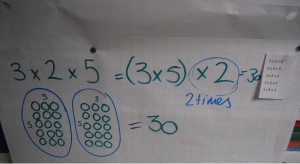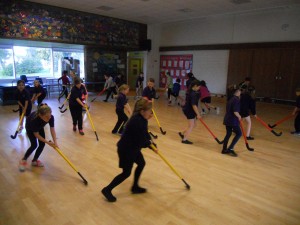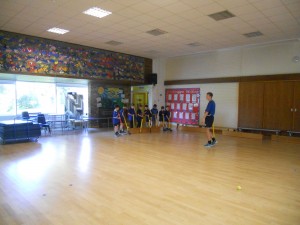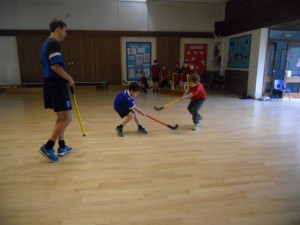Home learning ideas WB 7.12.15
Literacy:
This week, we have begun to study the Christmas story ‘Babushka’. We have looked at the sentence types by identifying the subject and verb in each sentence and whether the sentences are simple, complex or compound. We have practised varying our sentence openers using adverbs/adverbial phrases and prepositions/prepositional phrases. We have learned about speech punctuation and practised adding detail about a character through the things they say and do.
Ideas: Children could write a short description of a place at home using prepositions to describe where each thing is. They could take a story extract and add dialogue to it to show the reader how the character is feeling or behaving.
Maths:
This week, we have been focusing on written addition and subtraction. Children could practise using their preferred written algorithm working with pairs of four-digit numbers.
RE:
This week, we have been thinking about the Prophets and how their foretelling changed people’s beliefs and actions. Children could study the prophecies made by the Prophets about the coming of the Messiah. What did they say? What did they think would happen? Where did they think it would be?
Ukelele lessons
By Isaac Ash
On Mondays in year 4, at 2.00pm, we have Ukelele lessons. We play lots of different songs that all of us enjoy playing. Year 4 already know the names of the strings.
We have been learning Christmas songs because we are having a Christmas concert on Monday 7th December. As always, the concert will be free!!
Our wonderful teacher, Mrs McKenzie teaches us kindly and when we finish learning Ukelele, she wll continue to each us a new instrument. Who know what it might be!
We de not know what it is yet but we know it will be great fun and we can look forward to another fantastic concert next term.
Learning in Year 4
This week, we have begun our RE unit of advent. In preparation for the advent service on Tuesday, we have been learning about the Jesse Tree and its meaning and symbols. Along with this, is the new home learning pyramid for this unit, the deadline for these pieces of home learning are the Friday of the last week of term.
In maths, we have been looking at fractions. Children have been practicing identifying fractions based on different graphical representations and also comparing and ordering fractions with the same and different denominators. We have started to think about equivalence and how using a fraction wall can be a useful way to find equivalent fractions.
Here are some pictures from today’s lesson on comparing and finding equivalent fractions.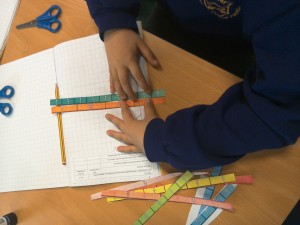
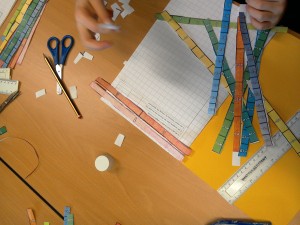
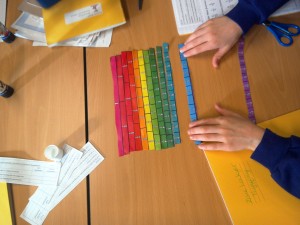
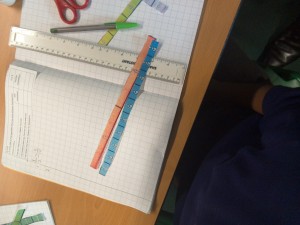
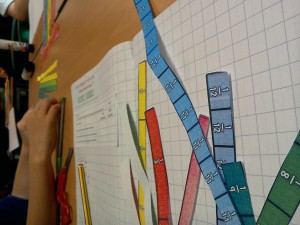
In Literacy, we have continued to read and study the Iron Man by Ted Hughes. Children have planned their own Iron Man sequels and are in the final stages of their apprentice writes before writing a draft and final version next week.
Home Learning ideas WB: 9.11.15
Here are a few ideas for home learning this week:
English: In English, we have continued to study the Iron Man. We have read various chapters, looking at the style and features of the author. We have looked at the impact of metaphors, similes and other figurative language (personification) and how these are used to create image in the mind of the reader. In the second chapter, we looked at repetition and the use of rhetorical questions as a tool to emphasise and engage the reader. Children could try writing a story opener that focuses on using these features.
Maths: In maths, we began the week using arrays and multiplication facts to find factors pairs for different numbers. We learnt about using commutative law to re-arrange multiplication sums so that they were easier to perform mentally. For example 3 x 2 x 7 can be re-arranged to (3×7)x2. We also practiced drawing repeated arrays to calculate with these sums for other calculations (see the attached photo for an example).
Then, we looked at ‘associative law’ and how this can be used to express a calculation differently to make it easier to perform mentally. Associative law allows a larger number to be broken into it’s factors and then the numbers can be re-arranged (as before) to calculate. For example, 12 x 7 can be expressed as 3 x 4 x 7 because 3 and 4 are factor pairs of 12. Children could use these methods and practice solving their own ?x?x? or ??x? calculations.
RE: in RE, we learnt about the Shema Prayer of the Jews and what this teaches us about our relationship with God and His powers. We then re-wrote the prayer into a more simple and easy to understand language. Children could research the praying habits or regularly used prayers of the Jewish faith.
Pompey in the Community
Today, we were lucky enough to be joined by Alfie, who many children already know through his work with Mr Mortimer.
Alfie now works for Pompey in the Community and joined year 4 for a ‘multi-sports’ taster session.
After a quick warm up, we played a 4-on-4 hockey game where each team was eliminated if they had a goal scored against them. The children really enjoyed the activity, which is just an example of the kinds of sports which are played at the ‘multi-sports’ club which runs on a Monday afternoon after school.
Children from across the school have been offered flyers with information about the signing up process as well as cost.
home learning pyramid for this half term
Here is the latest home learning pyramid for this half term.
Bloom’s HL – Circle of Life autumn 2
We were extremely pleased with the quality and effort that obviously went into the home learning projects produced in the last half term. we eagerly anticipate seeing the same level of variety and creativity for this half terms projects.
Year 4 team
Homework ideas Week beginning 12.10.15
nglish: This week, we looked at different techniques to open our writing, how to use emotive language to improve the description in our writing and also effective ways to end stories. Children could choose one part of a story to focus on using the different skills practised this week.
Maths: We have been learning to read and understand the information in different types of timetable; we have practised converting times from days to weeks, hours to minutes and vice versa. We also began to look at time distance graphs using the story of the tortoise and the hare. Children could work out: how many days, hours or seconds old they are? They could calculate the number of hours to Christmas. Another idea is to plan a day of television watching using the tv guide to work out how long each program is on for or what times they start and finish,
RE: We have begun our unit of prayers, saints and feasts this week. We looked at the story of Martha and Mary and how what Jesus teaches us about love can help us to treat other people. Children also continued to study the rosary, researching and then making lapbooks.
PAM:
Next week, as part of the PAM spelling, grammar and maths work that has been happening in school, children will be tested on the autumn 1 tricky words as sent home at the start of the half term. These were; interest, island, knowledge learn, length, library, material, medicine, mention and minute. There will also be a longer than usual maths test to assess where the children are in comparison with the start of the year and their end of year expectations.
Homework Ideas Week beginning 5.10.15
English: This week, we have been writing stories which raise issues around animals (conservation, threat to habitat, re-homing etc). We focussed on creating mood through careful word choice and using shows and not tells. Write a character or setting description (or both) which creates mood
Maths: We have been learning to read, write and convert times from analogue to digital and vice versa. Then we practised calculating how long something lasted if we knew the start and end times by counting forwards on a number line. Draw a timetable for one of the days of the weekend and write all/some of the things you do (start and finish times). Then use a number line to calculate the duration of each activity/event/journey etc.
RE: October is the month of Mary and this week we have begun to think about the glorious mysteries of the Rosary. Children could reflect on one (or more) of the glorious mysteries. They could even make their own rosary.
Context: We have begun to look at animals can be classified differently according to their features. This will lead on to looking at how animals are classified scientifically, based on being vertebrates or invertebrates and each sub-group within these. Children could choose one animal sub-group (e.g. reptiles/mammals) and create a poster describing their features.
Marwell Zoo Trip and home learning
Despite, the weather, everyone had a fabulous time on Monday at Marwell Zoo. The children were fascinated to observe some beautiful or unusual (or both) animals from all corners of the world.
Keep posted for an full update, along with some pictures from the day, next week.
Ideas for home learning
Week beginning 21.9.15
English: This week, we have been writing persuasive adverts for Marwell Zoo using a range of features such as rhetorical questions, exaggeration and emotive language. Create an advert of your own for anything you choose using the features we have discussed this week.
Maths: This week, we have been working on using inverse operations to solve missing number calculations e.g. 41 + __ = 74. We have also practised a range of strategies when adding and subtracting mentally. These were: nearly numbers, using number facts, partitioning and near doubles.
RE: This week, we have looked at the story of Abraham (Genesis 22: 1-19) and thought about how Abrahams’ beliefs affected the decisions he made in the story as well as how he felt at different parts. We began writing diary entries to show how his thoughts, feelings and beliefs changed throughout the story. Choose another story from the bible and write a recount which shows how a character’s beliefs change throughout.
Context: Our trip to Marwell provided the basis for this week’s context learning. We have begun to think about conservation and its importance in the survival of different animals. Children could choose an animal and create a poster listing the threats to its survival (habitat, hunting, farming etc).
This Week in Year 4
Well, what a busy three days!
The children new to year four have settled into the routines excellently. They are rising to the higher expectations of year four and showing great potential already.
Today, they were issued with their home learning diaries, adventure books, presentation guidelines and home learning pyramids.
Please find attached the pyramid as well as a copy of the presentation guidelines.
Children were very excited to hear the news about the trip to Marwell zoo on the 21st September. The letter for this is also attached.
We hope the children had an enjoyable first week and we look forward to a busy year. Keep checking the blog each week to find out what the children have been learning and for more news on latest events.
The year 4 team.
